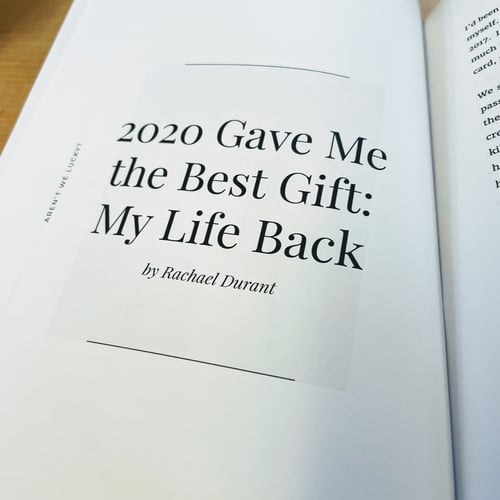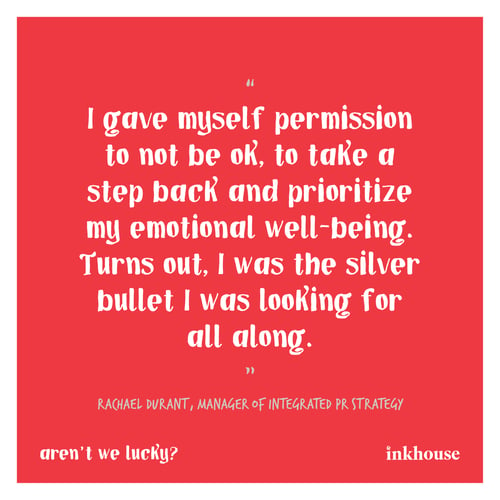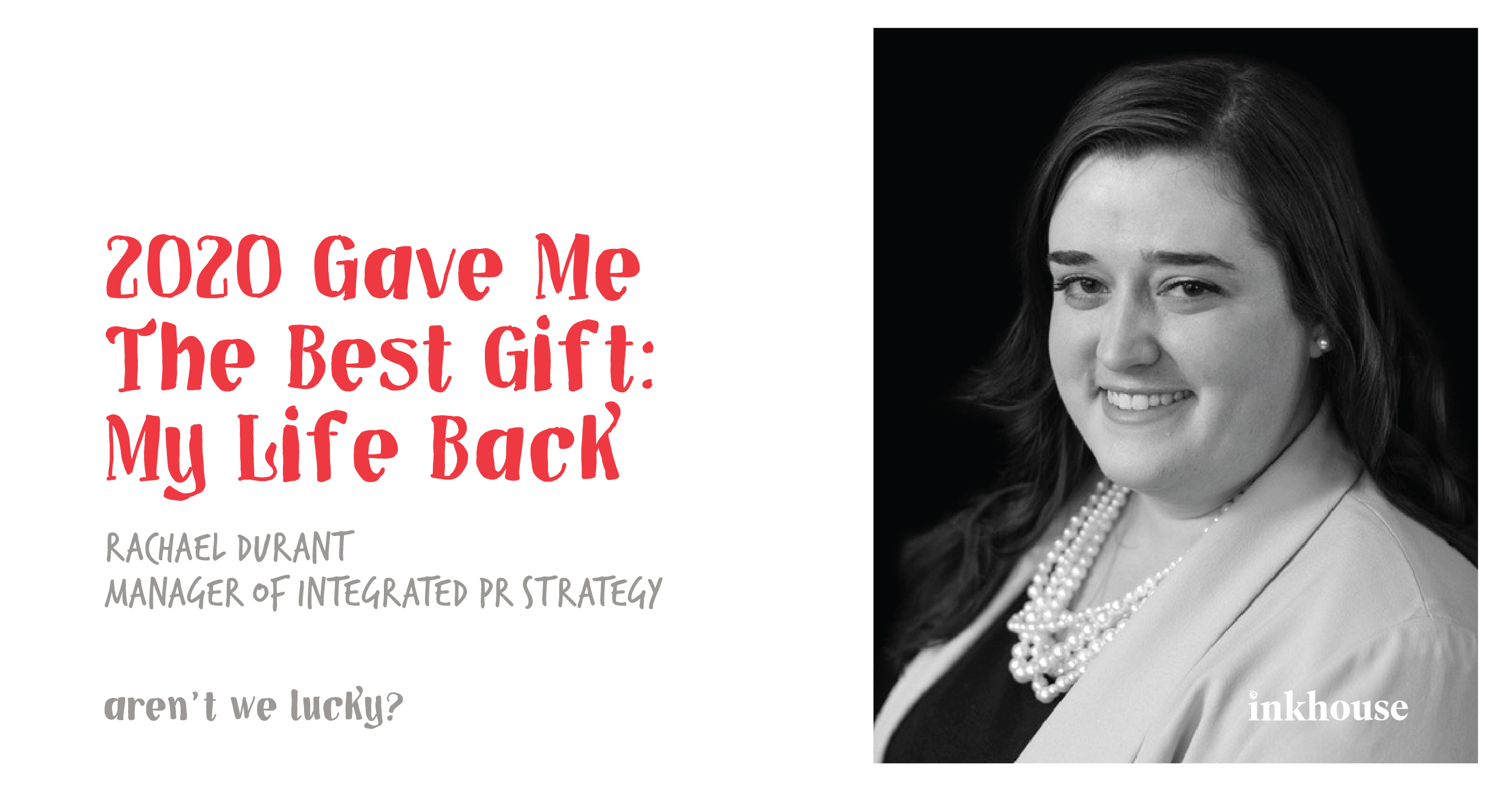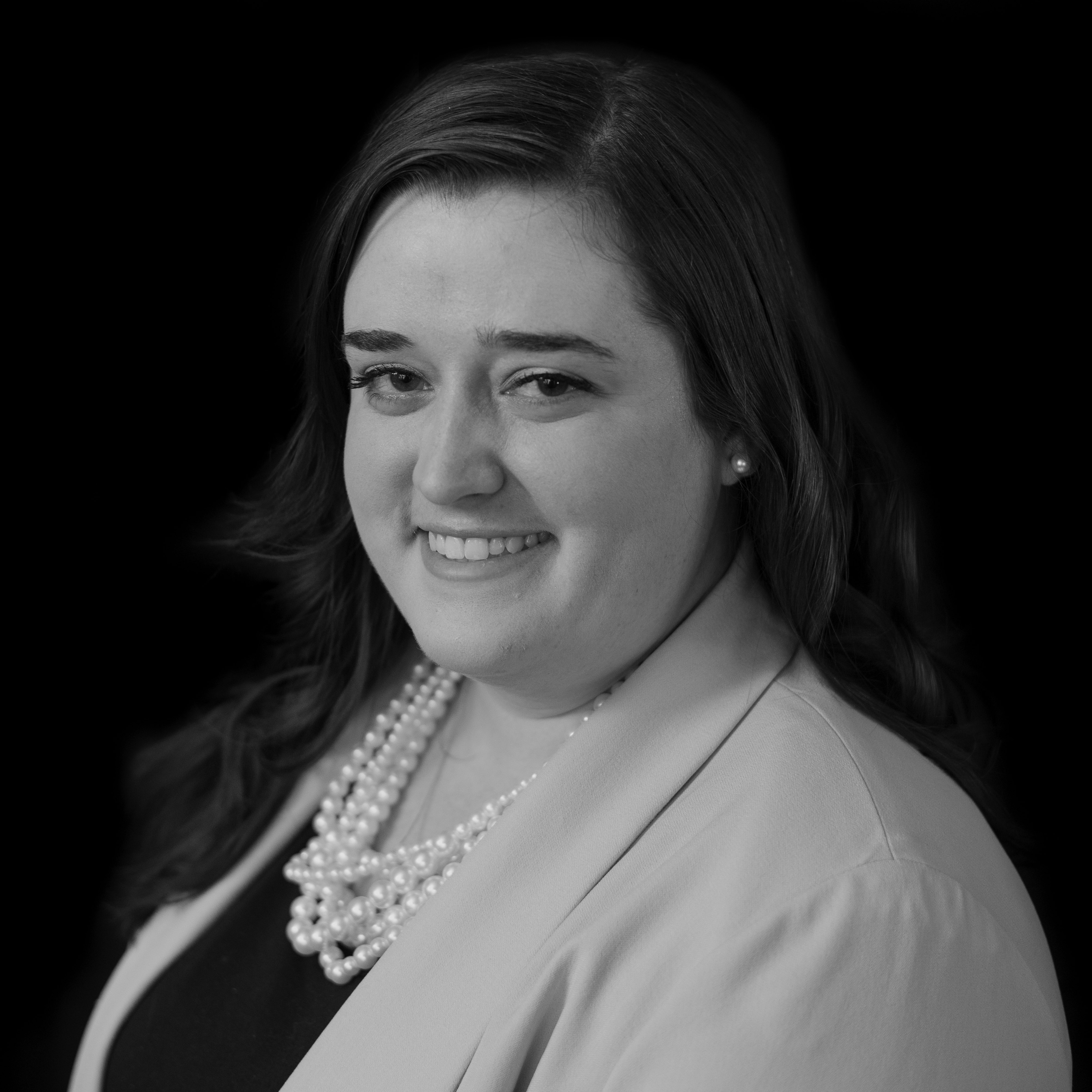2020 Gave Me the Best Gift: My Life Back—An Employee Essay from “Aren’t We Lucky?”
Oct 21, 2021 Rachael Durant
I’d been drinking the night I told my boyfriend I wanted to kill myself. It wasn’t planned, but it was the truth. It was October 2017. I’d been out with colleagues. It was easy to drink too much with them. Anytime someone threw down the company card, we all ended up a lot drunker than we anticipated.
We spilled out of a dank bar basement, and I stumbled to the passenger side of our car, where my boyfriend waited. He knew the drill. Before he drove off, he checked that I had my bag, credit card, and phone. We had a forty-five-minute drive to kill and I was beyond the point of a pleasant buzz. Who knows how many Jack and Cokes with lime I’d consumed, but they had done their job of quieting my inhibitions.

I surprised myself by asking my boyfriend if I could tell him something without him getting worried or upset. He agreed, but I detected a practiced reticence in his voice. He was used to my asking him again and again if he was sure he really liked me—my common drunk refrain.
But that wasn’t top of mind that night. Instead, I cracked open. “I’m bad at my job. I’m not being a good girlfriend or friend,” I sobbed. “I work so hard, and for what? Nothing ever gets better. And more and more every day, a bigger part of me wonders what the point is. Why even keep living?”
He kept his eyes on the road and managed to sound calm when he asked, “Is that a sincere question?”
“Of course,” I spat out between sobs. “Everyone would be better off if I died, and I think a lot about how to make that happen. Every single day, I think of a new way to do it. I’m starting to scare myself, because I keep coming close and I don’t know how much longer I can stop myself.”
The next morning, he hadn’t forgotten the conversation, even though I hoped he would. I looked for ways to walk back what I had said and get him back to blissful ignorance of the dark clouds inside me. If he knew I hated myself to the point of wanting to end my life, would that make him realize that he didn’t like me either?
I came up with a lot of excuses. It was the arduous commute to Boston that was making me miserable. The long hours I worked. I wasn’t taking care of myself. I told him the cure was a job with more work-life balance. That felt like an easier solution than shining a light into the darkness.
This would have been a good time to seek professional help. If it had been a friend of mine in this situation, I would have strongly recommended it. But I was “fine.”

I’d given up on that kind of help back in high school. My AP Psychology teacher described the symptoms of generalized anxiety disorder—fatigue, trouble sleeping, irritability—and I suddenly realized that she was also describing me. It was scary to learn it wasn’t normal to sleep three hours a night after staring at the ceiling for hours with racing thoughts.
I was seeing a therapist at the time, and when I mentioned this, he asked, “Do you ever tell yourself to stop thinking so much?”
Gee, why didn’t I think of that! After that, I never went back to therapy. I didn’t need a therapist to downplay my symptoms and make me feel weak and stupid for asking for help.
With no savior in sight, I resigned myself to managing on my own, without professional help. It looked like this: I scheduled a full class load and believed anything less than an A was a failure. I sat on the executive board of two clubs (one that I helped found) and participated in several others, skipping sleep or meals to fit it all in my schedule. I worked on campus between classes and some weekends. I also went out with my friends nearly every night of the week. These were good distraction strategies that had the added benefit of allowing me to escape my thoughts.
If I slowed down and spent time with myself, my doubt, fear, anxiety, and ultimately, the darkness caught up. Crying on my dorm room floor over a textbook the night before a final escalated to my throwing up once an hour because I thought I was stupid and unprepared and was certain that I would fail, even though I had an A in the class. I read too much into my boyfriend’s lack of responsiveness when I tried to talk to him at 2:00 a.m., losing sleep over it and picking fights when he responded during normal human hours.
After my passenger-seat confession, I did the same thing I’d been doing my whole life: I got busier. I started a new job and quickly found myself back to battling a host of issues, like vomiting most mornings on my way to work. But I pushed through. Did my friends all secretly hate me and think I was overbearing and weird? Would my colleague read too much into the tone of that email where I used a period instead of an exclamation point? I didn’t know the reality that “normal” people don’t worry relentlessly, to the point of sleeplessness, about these big and small problems.
Then the skin on my hands went numb. Months of appointments and testing later, I still didn’t have answers and my doctor was ready to refer me to a neurologist. One of the conditions we had yet to rule out was multiple sclerosis.
I started to notice other symptoms, like a weird internal electrocution sensation in my core. I turned to Google, where medical conditions go from simple to scary in the space of a few clicks. After consulting the Mayo Clinic website, WebMD, and a couple of sketchy blogs for good measure, I found another potential diagnosis for these symptoms: anxiety.
Thinking back to that conversation in high school, I saw the puzzle pieces of my various symptoms—all seemingly disparate, with no cause—come together. Because I wanted this to be true, I built my case.
Reason one why anxiety was more likely: my personal and family medical and mental health history. Reason two: My profession regularly ranks among the most stressful and therefore could be an anxiety trigger. And the unspoken third reason: I didn’t want to have multiple sclerosis.
I practiced saying these talking points out loud. Just ask my poor boyfriend and my mom, who listened to my rehearsals over and over (and over) again. On my commute to and from work, I imagined how the conversation would go and what the doctor might say—from the realistic to the ridiculous—so I could practice my responses. I had to be right.
My practice went out the window when I was sitting in front of the doctor. Instead of my talking points, I squeaked out, “Could we maybe try treating it as anxiety before consulting neurology?”
Then I shared my reasoning, admitting to my Googling. My doctor agreed with my theory and had me fill out a basic psychological inventory that confirmed a diagnosis of moderate anxiety. My PCP prescribed an antidepressant, and in two short weeks, I could feel my hands again.
My doctor suggested talk therapy to bolster my medication. Had I learned my lesson? Did I immediately seek that treatment?
No. This is America, baby, and I only wanted to buy a quick fix, because if I had to try, that might mean I could fail. Instead, I got busy again and had no time to commit to regular therapy sessions. I felt great; 2020 was going to be my year.
But then COVID-19 shut down the world, and with it, my usual distractions. After work, I sat on the couch for hours, scrolling through TikTok, Twitter, and Instagram. Rinse and repeat. I was tired, but I couldn’t sleep. Chores and obligations piled up around me in my eight-hundred-square-foot world.
The darkness crept back in. That relentless little voice reappeared, whispering how much better off everything would be if I were gone. And I began believing it, again.
One night while we sat quietly in our own worlds, focusing on our little screens, I turned to my now fiancé and said, “I don’t want to alarm you. I just need you to know that I am thinking a lot about hurting myself again and I can’t make the thoughts stop.”
Many emotions played across his face in an instant, culminating in the realization that he was now back at work, which meant I was left to my own devices for hours on end. “Promise me you will call, no matter what?”
Just like that, our shared fantasy—that my recovery was complete—was over. I sought an explanation within, asking how I was still sinking further and further into depression quicksand when I was dutifully taking my small white pill each morning.
At a familiar crossroads, I made a different choice. Worn down by years of trying to rescue myself, only to fall short, I got professional help in the form of regular talk therapy.
And it all got so much better. My therapist validated my thoughts and feelings, even when I tried to downplay them, and continues to do so to this day. She knows I am self-deprecating and a people-pleaser who thrives on external validation, so she will often remind me that I am getting an A-plus in therapy. Though she assured me that I was doing the work, I didn’t believe it yet. The other shoe was still going to drop, that negative voice inside me said.
Then my step-grandfather became seriously ill. Only a few days before an annual conference I help to organize, my dad called to let me know that it was likely only a matter of days before Grandpa Fred passed away.
The old version of me, the one who could save herself, thank-you-very-much, wouldn’t have afforded me the kindness to take a few days off work to be with my family and grieve. The overwhelming guilt would have pushed me to work through those hard days and resent the fact that I couldn’t take care of my emotional needs.
When Grandpa Fred passed away the day before my conference, I had to make a call regarding my participation. Slated to moderate a panel, I could fall into my familiar patterns and push through with a fake smile.
But then I did the damnedest thing. I called on my community, my fellow conference organizers, and asked for help. I took time off of work, and asked my fiancé for support when I needed it. Despite my fear that it would change how people thought of me, everyone loved me through it all.
One example of prioritizing my mental health does not mean my problems are magically solved. I still go to regular therapy. Each morning, I take antidepressants. But the frequency and intensity of my anxiety and depression are more manageable.
I learned that I can give myself permission to not be ok, to take a step back and prioritize my emotional well-being. Turns out, I was the silver bullet I’d been looking for all along.
This essay appears in our book, Aren’t We Lucky? Stories of Resilience from the Inkhouse Community. Download your copy here.






